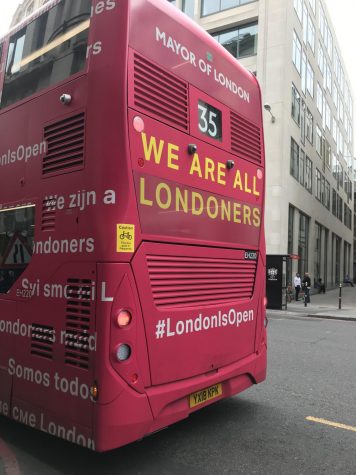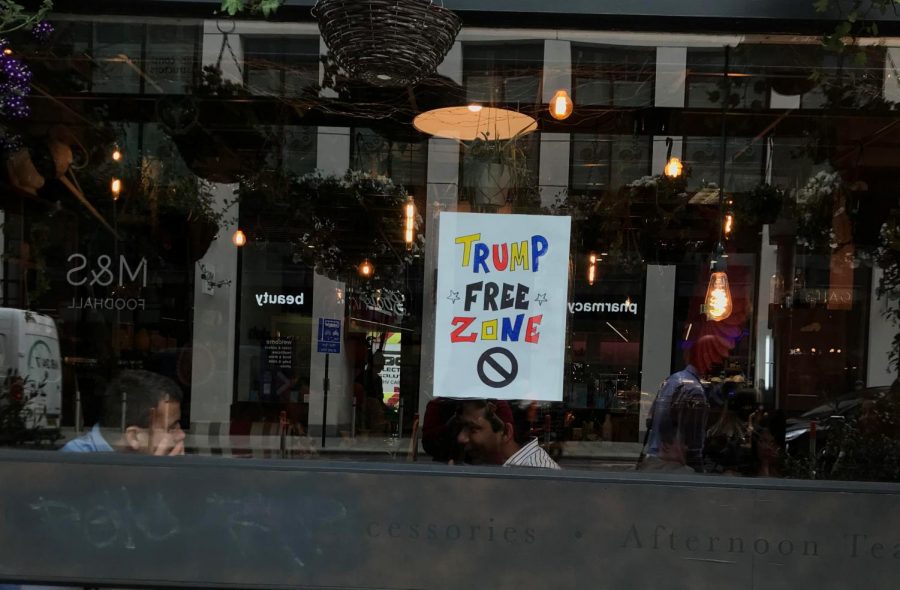What My Embarrassment Being an American Taught Me
January 22, 2020
Last summer, I got an amazing opportunity, thanks to Arapahoe, to travel to Europe with my peers and teachers. Although I was weary walking off my 8-hour flight into Heathrow, the electric energy I felt in this city was compared to nothing else. After months of saving, planning, packing, and counting down, I was on the cobblestone streets of London- the land of tea and biscuits, of driving on the left, and saying “lifts” instead of “elevators.”
However, our time in The Big Smoke happened to overlap with president Donald Trump’s state visit. And Londoners were not happy.
While walking down Waterloo, I saw signs on establishments stating that they were “Trump-free zones.” My views of strolling along Piccadilly Circus contained 19th-century architecture and busses decorated in the words “we are all Londoners,” which were statements referencing America’s growing immigration issues. My first ever time on the Tube was along protesters holding signs about how they wanted him and everything he stood for far, far away. And I was amazed. 
These moments made it clear to me their knowledge of American politics compared to our knowledge of theirs. Try as I might, I fail to even scratch the surface of Brexit and I couldn’t name their prime minister if you asked me (it’s Boris Johnson, by the way. Thanks Google).
I was also acutely aware whenever I spoke. My enunciated “R’s” and “T’s” feel like a verbal equivalent of a scarlet letter.
I remember in vivid detail seeing a man with a Canadian hockey shirt and turning to my friends who were thinking the same thing as me- oh, to be a Canadian. Similar enough, but they have the bliss of not carrying the weight of our president’s tweets on their shoulders. He doesn’t have to admit that his country is run by a man who mocked a disabled veteran in front of thousands of people, millions of viewers, our differences include the regularity of the word “eh” and the fact that their leader hasn’t been accused of sexual harassment and assault.
A simple Google search of American stereotypes will lead you to find out that abroad, we are seen as loud, rude, and naive of everything that isn’t American (and even things that are American. According to a 2017 poll from the University of Pennsylvania, only a quarter of Americans know the three branches of government).
I know that calling for a total change for the whole country is a bit ambitious, and I am aware of all of the good things our nation has to offer. I can’t completely write off the country that has provided me with a place to call home- camping trips in the mountains and baseball games and apple pie. But, my fellow young people, the future voters and participants and possible future leaders of this nation, there is always room for improvement, and all I am saying is that I have felt it. As I’m sure you have.
Things such as the current impeachment trial have brought a lot of young minds and voices into politics. In more recent years, young people have reported feeling more politically empowered and a record-breaking amount of young voters (18-29) showed up to the 2018 midterms according to the United States Census. These patterns are eminently positive and exceedingly hopeful for the future.
And hopefully, these trends will be equally present when the 2020 election comes around.
So, to all my voting-aged readers, I’m going to end this by urging you to stand up for the America you want to see. The experience I felt traveling across the Atlantic shaped me, but it doesn’t necessarily take the expense of a plane ticket to feel the need for change- no money is required to be an informed voter.



Megan • Jan 24, 2020 at 8:06 pm
Nicely written article, I think it is important for the “youth” to take part in the political process and broaden our scope. Traveling and seeing other people’s positions does just that. Thanks for your perspective on this!
Joe Peterson • Jan 22, 2020 at 4:01 pm
This article is unacceptable. In all my years on this planet I have never been ashamed to be an American. If you can’t even walk around a foreign country and not be ashamed of the country you came from… that gave you the opportunity to travel to another continent. Maybe you shouldn’t be living in the greatest country on the planet. Millions of people would gladly die for this country. And risk their lives to get in and you have the audacity to say that your ashamed. That’s some of the most anti-American *censored* I have ever heard.